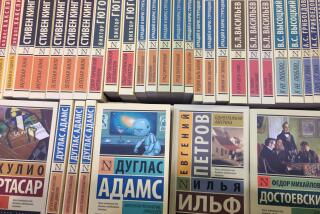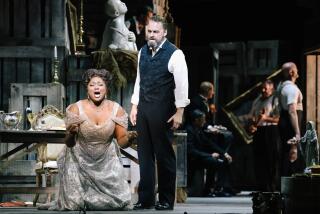Energetic Russian Acts Speak Every Language
- Share via
The old Russian New Year, which arrives on Wednesday, was celebrated in grand style at the Universal Amphitheatre on Sunday night with a talented lineup of Russian musical artists. Presented in several U.S. cities over the past few years, the event, “Today’s Stars--Timeless Songs,” was making its Los Angeles debut.
The colorful program was clearly aimed at the Southland’s growing Russian population, which turned out in force, nearly filling the theater and responding enthusiastically to the Russian-language presentation.
And there was a lot to be enthusiastic about. The performers ranged from big-voiced, traditional stylists to pop-rock performers with a ‘70s tinge. Singing traditional songs as well as pop numbers, they blended international styles with Russian roots, often in oddly unexpected fashion.
Leonid Agutin, for example, a singer with the frizzy hair and boyish manner of a Kenny G, topped off his rock vocal phrasing with a stage manner--including one imploring passage on his knees--reminiscent of Al Jolson. Valery Maladze, in a severe dark suit, sang his ballads with the flair of a Barry Manilow. Christina Arbakeit and Alena Apina--striking-looking blonds with purring voices--were alternately reminiscent of Marilyn Monroe and Madonna. And Natasha Koroleva had the energy and verve of a college cheerleader.
Virtually all of the vocal numbers were accompanied by a company of eight dancers, beautifully executing choreography ranging from hip-hop to traditional Russian folk dance. And the production was illuminated by a gorgeous backdrop consisting of several layers of curtain and scrim depicting the snowy Moscow skyline. Lurking behind the curtain, a group of three musicians supplemented the massive, rock-rhythm sounds of recorded tape numbers.
But the best element in the production was the work of the Cabaret Duet Academia, a Sonny & Cher-like duo whose music and comedy were consistently entertaining--even to non-Russian-speaking members of the audience. Given an English-language act, their international potential would be substantial.
More to Read
The biggest entertainment stories
Get our big stories about Hollywood, film, television, music, arts, culture and more right in your inbox as soon as they publish.
You may occasionally receive promotional content from the Los Angeles Times.







